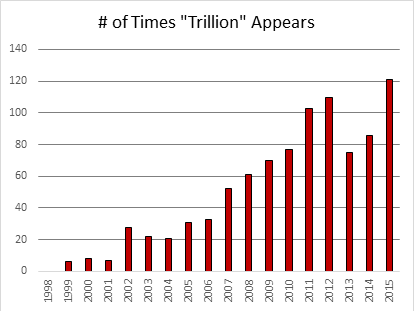The reported national debt is a) large, b) growing fast, and c) likely understating the truth, given the complex issues underlying the measurement of the ‘true’ national debt.
How sustainable is our government’s current fiscal path? How can we come to grips with this question, in a complicated financial world?
In a world where many organizations issue complicated reports that are difficult to interpret, the U.S. government gives us some of the greatest challenges.
When faced with analytical challenges like this, it can make sense to step back a little. You can do simple things to help inform overall judgment.
For example, the AIG (American International Group) implosion in 2008 was one of the most amazing corporate meltdowns in modern financial history. AIG also provided some of the most complicated statements around, at least for private companies. But one thing you could have done, back in early 2008 (and I did), was count the number of times the phrase “credit default swap” appeared in the annual report.
In AIG’s annual report for 2003, “credit default swap” was in there once. In 2004 and 2005, my memory recalls it was in there twice. In 2006, it was in there 3 times. But in the 2007 annual report, which came out in early 2008 (before the real meltdown), it was in there something like 107 times.
How about the federal government? Here’s another simple exercise.
The modern “Financial Report of the U.S. Government” has been issued annually since 1998. In the latest year, this report was 274 pages long.
The word “trillion” was mentioned more than once in those 274 pages. In fact, it shows up 121 times.
The chart below shows the number of times the word “trillion” appeared in each of the annual reports issued since 1998.

Granted, the report itself has gotten longer over time. But not like this. Back in 2000 there were 142 pages. The number of pages have doubled, but the number of ‘trillions’ has risen 15 times.
A trillion here, a trillion there, pretty soon, you might really have something. Hope it isn’t a fiscal crisis.

